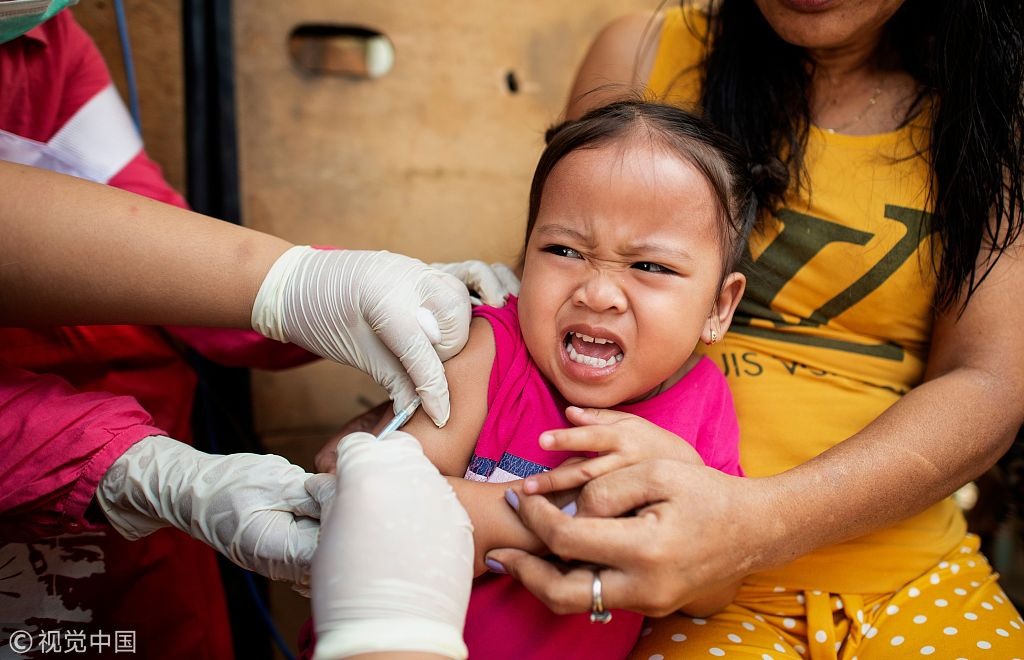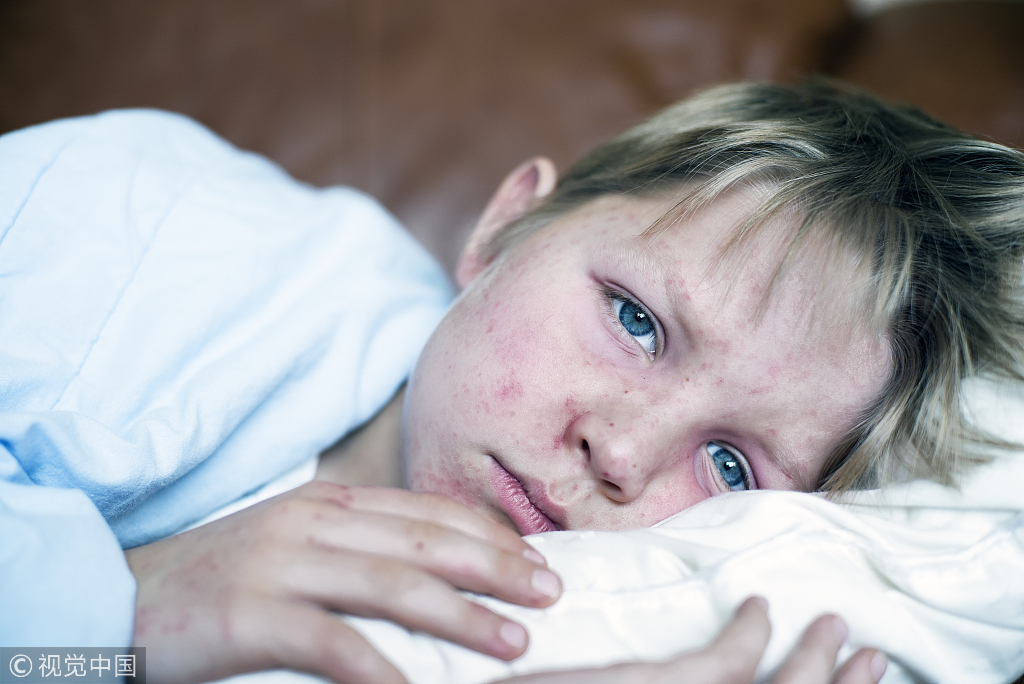
Health
18:05, 01-Mar-2019
The revival of measles in the era of misinformation
Henry Zheng

Measles is alive and well.
The viral disease is considered highly contagious and can cause high fever and flat blotches to appear on the skin. Left untreated, measles can result in death. It was once considered a relic of the past in developed countries, cured by science, but outbreaks around the world this year tell a story of distrust and ignorance.
The World Health Organization has warned that Japan is experiencing the worst measles outbreak in a decade. Over half of the more than 170 people infected since January were members of a religious group that believes medicines harm the body. Similarly, the 200-plus affected in the Philippines did not get vaccinations for measles, with authorities citing public distrust of government immunization programs after a vaccine for Dengue fever was found to put lives at risk.
Contagious viral diseases such as measles can be contained or eradicated only if a population reaches a certain level of immunity. That's why health experts want those who aren't infected to get vaccinations so that if they come into contact with the few who are infected, they don't become carriers of the disease and transmit it to the larger population. This concept of a human fence isolating the sick is known as “herd immunity”. But in places such as the United States, there is a growing movement of parents who want their children to opt out of vaccination schedules.

A child reacts during a shot in Manila, Philippines, on February 16, 2019. A growing measles outbreak killed 25 people in the country in January. /VCG Photo
A child reacts during a shot in Manila, Philippines, on February 16, 2019. A growing measles outbreak killed 25 people in the country in January. /VCG Photo
These “anti-vaxxers” have grown in prominence in the past decade, even attracting Hollywood stars to their crusade. Many believe that vaccines can cause autism, a developmental disorder where those affected have trouble interacting or communicating with others. Symptoms of the disorder are often identified during childhood.
The link between vaccines and autism was first put forward by Andrew Wakefield, a former doctor in the UK who published a paper alleging the connection in the prominent medical journal the Lancet. The paper was retracted after a Sunday Times investigation found that the families of the patients in Wakefield's study had legal action against the manufacturer of the MMR vaccines (measles, mumps, rubella), and that the doctor's study had been funded to furnish evidence for the case. The UK medical establishment claimed that Wakefield had performed unnecessary medical procedures on the patients without ethical approval. It then revoked his medical license and banned him from practicing.
That didn't spell his end. Wakefield subsequently made a name for himself in the U.S. promoting the “anti-vaccination” cause. His 2016 documentary, “Vaxxed,” was even supported by Robert DeNiro, whose son is autistic, before the latter reversed his decision.
Taking a stand against misinformation
Children generally receive a dose of the MMR vaccine when they are 15 months old, and again at 4-6 years old. In the U.S., however, children under the age of 2 who haven't received such vaccines have quadrupled since 2001, according to the U.S. Centers for Disease Control and Prevention (CDC). This number is growing, though the reasons for not getting the shots range from religious beliefs to lack of health insurance. Some parents may not even know that children can get free immunizations under a government-funded program.
Although the U.S. federal government requires children to follow an immunization schedule, three states allow for medical exemptions, while the others allow exemptions based on personal or other beliefs. The country had declared itself free of measles in 2000, but just last year, the state of Texas alone had nine cases. Some state legislators are even pushing to make the process easier for parents to request exemptions for their children.
The spread of misinformation about vaccines harming children has become easier, especially in the digital age. There are websites and social media posts touting the “dangers” of vaccines, often by respectable-sounding names such as the National Vaccine Information Center. Even though scientific research has shown that autism is not caused by the MMR vaccine, anti-vaxxers have continued to exploit parental concern to cultivate distrust of the medical and scientific establishment.
Social media platform Pinterest made news when it took a stand against misinformation by banning anti-vaccination posts, but so far it is alone among the Internet giants in strictly regulating such fraudulent medical content.

Symptoms of measles include high fever, coughing, runny nose and a rash consisting of flat bumps. /VCG Photo
Symptoms of measles include high fever, coughing, runny nose and a rash consisting of flat bumps. /VCG Photo
The science is settled, but anti-vaxxers comprising worried parents and those with an agenda are gaining greater exposure and influence. For parents of autistic children, a straightforward cause in the face of uncertainty can be comforting. However, abstaining from vaccinations doesn't only affect those who don't take the shots, but lowers a population's herd immunity, which increases the risk of disease outbreaks. The CDC estimated in 2014 that vaccinations could prevent over 700,000 children born over the last 20 years in the U.S. from dying. The number of children who are affected by a preventable disease could continue to increase if left to parental discretion.

SITEMAP
Copyright © 2018 CGTN. Beijing ICP prepared NO.16065310-3
Copyright © 2018 CGTN. Beijing ICP prepared NO.16065310-3